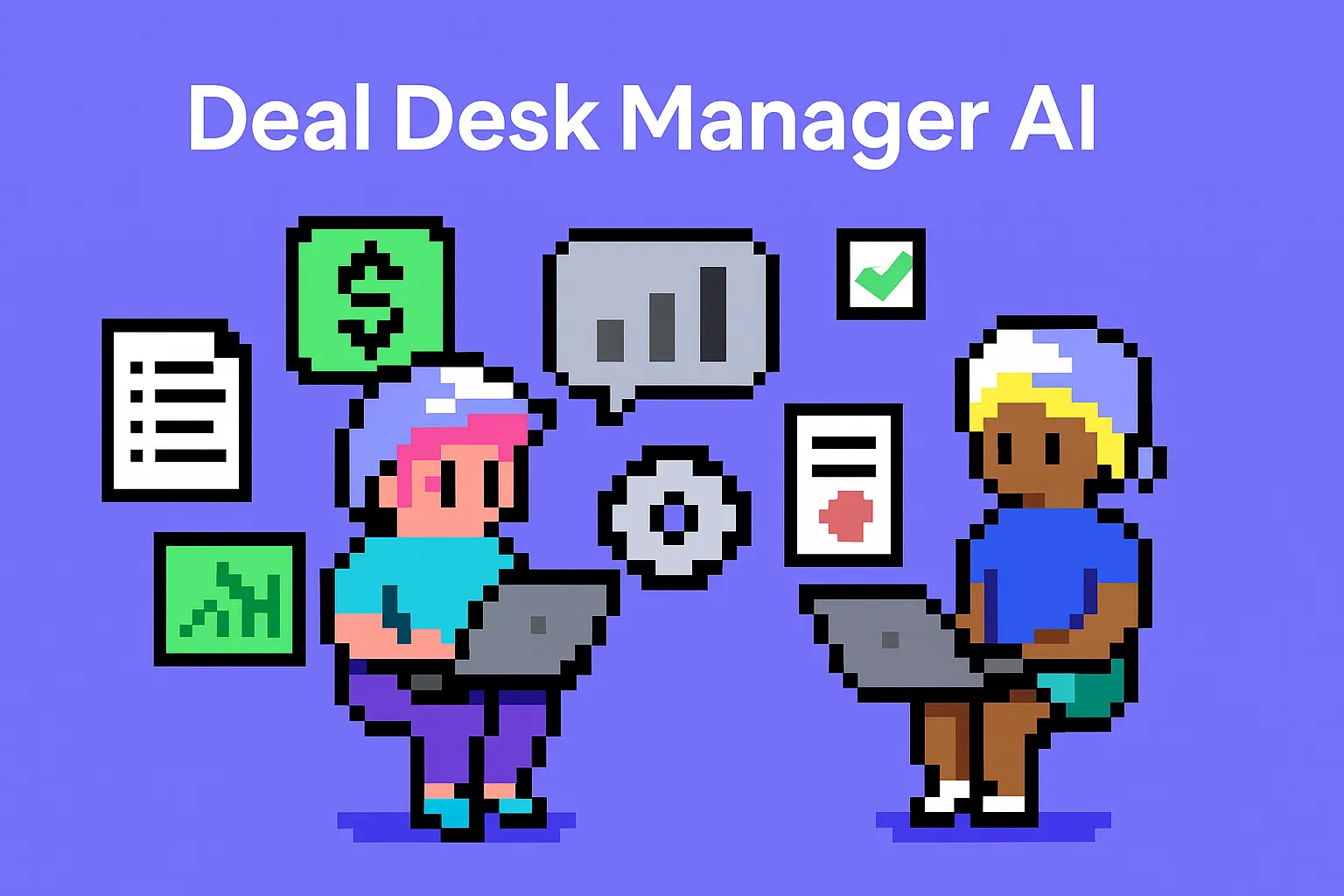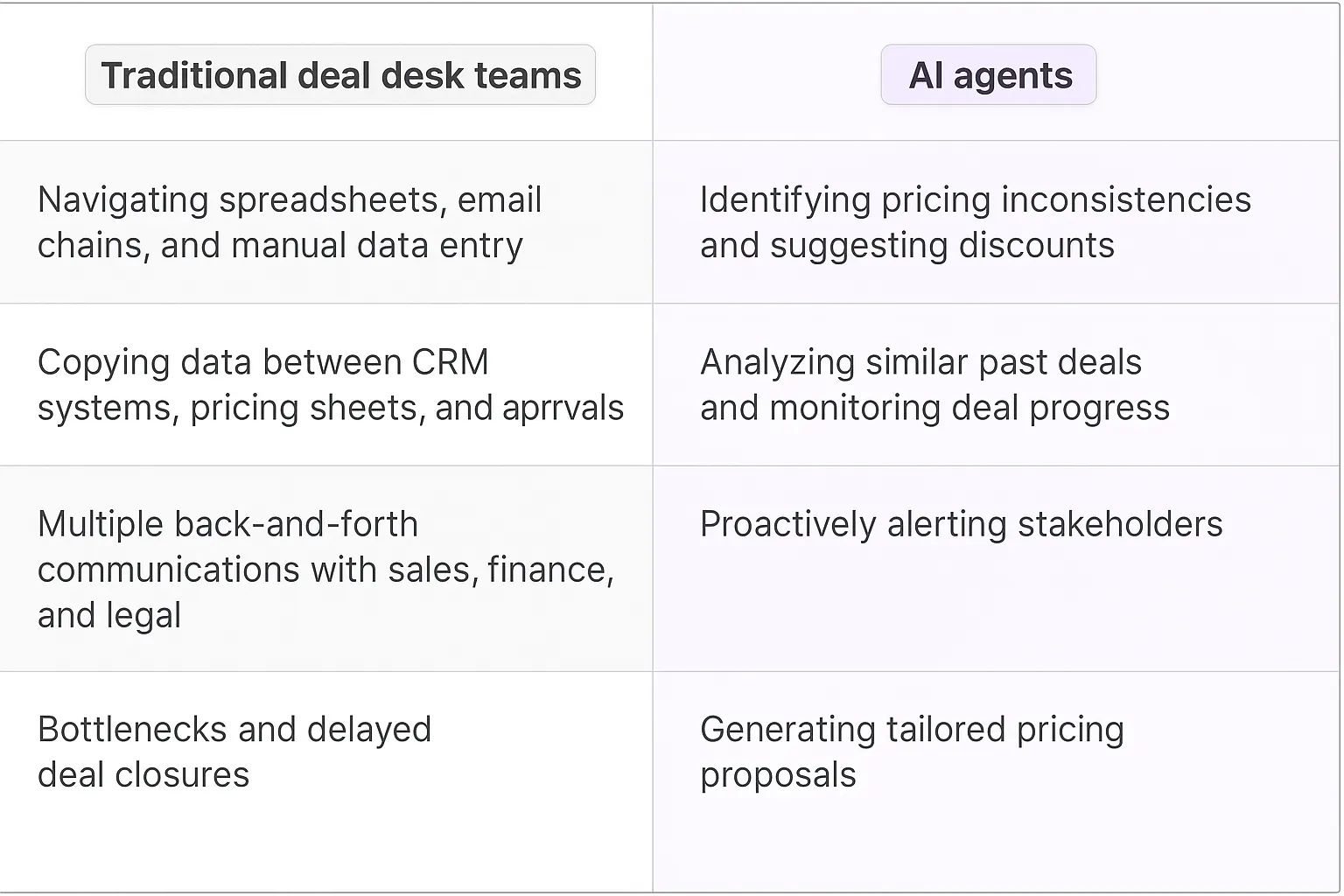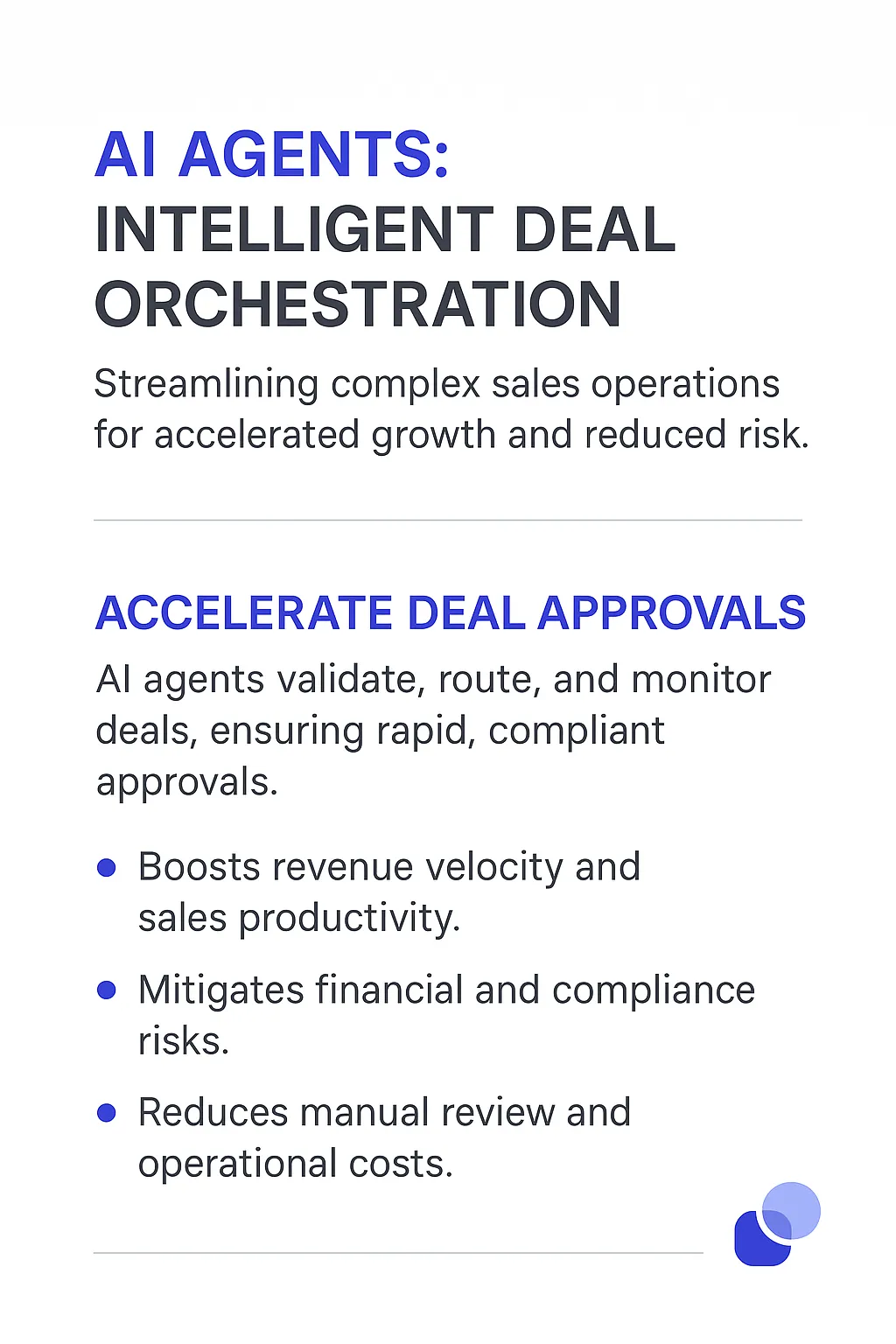Deal Desk Manager represents a sophisticated AI-powered system designed to orchestrate complex sales operations. It serves as the central nervous system for pricing decisions, contract negotiations, and approval workflows. Unlike traditional deal management tools, it actively learns from each transaction to build a knowledge graph of successful deal patterns and potential pitfalls.

Deal desk teams traditionally operated through a maze of spreadsheets, email chains, and manual data entry. Sales ops professionals spent countless hours copying and pasting data between CRM systems, pricing sheets, and approval documents. The standard workflow involved multiple back-and-forth communications between sales reps, finance teams, and legal departments - often leading to bottlenecks and delayed deal closures.
The integration of AI agents into deal desk operations fundamentally shifts how teams handle complex pricing and contract negotiations. These digital teammates excel at pattern recognition across historical deal data, enabling them to flag potential pricing inconsistencies or suggest optimal discount structures based on deal parameters.
When examining the deal approval process, AI agents can simultaneously:
The real game-changer is how AI agents handle exception management. Instead of waiting for human intervention on non-standard deals, these systems can immediately identify the specific approval requirements and route them to the right decision-makers. This cuts the typical approval cycle from days to hours.
From a scaling perspective, AI agents enable deal desk teams to handle significantly more transactions without proportionally increasing headcount. A single deal desk manager can effectively oversee 3-4x more deals when supported by AI agents, focusing their expertise on strategic decisions rather than administrative tasks.
The network effects are particularly interesting - as these AI agents process more deals, they become increasingly sophisticated at identifying winning patterns and potential red flags, creating a continuous improvement loop that enhances deal desk operations over time.

The most interesting aspect of Deal Desk AI agents isn't just the automation of individual tasks - it's the compound effect of connecting deal data across the entire revenue organization. When a Deal Desk AI agent processes thousands of contracts, it builds an invaluable knowledge graph of pricing patterns, negotiation tactics, and deal structures.
This creates powerful feedback loops: Sales teams close deals faster because they can instantly access proven pricing models. Legal reduces risk by leveraging pattern recognition across the contract database. Finance gains real-time visibility into how deal terms impact revenue recognition. The more deals flow through the system, the smarter and more valuable it becomes.
We're seeing early adopters use Deal Desk AI to cut deal cycle times by 40-60% while maintaining better compliance and control. But the real unlock is how it enables companies to scale complex enterprise sales motions without linear headcount growth. This is the kind of leverage that creates category-defining companies.

Deal desk management AI agents are transforming how companies handle complex sales operations across multiple sectors. The intersection of AI capabilities with deal desk workflows creates powerful opportunities to accelerate revenue operations while maintaining compliance and reducing friction. Let's dive into specific examples of how different industries are leveraging these digital teammates to enhance their deal desk operations.
The versatility of AI agents in deal desk management makes them valuable across various industries. From SaaS companies managing intricate enterprise contracts to manufacturing firms juggling complex pricing matrices, these AI-powered solutions are becoming essential members of modern revenue teams. They excel at tasks that traditionally created bottlenecks in deal progression - from proposal creation to approval routing to compliance verification.
What's particularly fascinating is how these AI agents adapt to industry-specific nuances. They're not just processing requests; they're learning from each interaction, understanding industry terminology, and becoming more sophisticated in their ability to handle specialized deal requirements. This continuous learning loop means they become more valuable over time, developing deep expertise in particular vertical markets.
The SaaS industry faces a unique challenge: complex, multi-stakeholder deals that require careful orchestration across sales, legal, finance, and product teams. A Deal Desk Manager AI Agent transforms this traditionally fragmented process into a synchronized dance of efficiency.
Take a mid-market SaaS company selling enterprise software. Their sales team juggles 50+ active deals, each with custom pricing, specific product configurations, and unique legal requirements. The Deal Desk Manager AI Agent acts as the central nervous system for these transactions, monitoring every deal stage and proactively managing bottlenecks.
When a sales rep submits a non-standard pricing request, the AI analyzes historical deal data, current market conditions, and customer attributes to provide intelligent pricing recommendations within minutes - not days. It automatically flags potential revenue recognition issues and suggests optimal contract terms based on the customer's industry and size.
The real magic happens in the approval workflow. Instead of endless email chains and forgotten Slack messages, the AI orchestrates a synchronized approval sequence. It routes specific contract sections to legal for review, pricing details to finance for validation, and technical requirements to product teams for feasibility checks. Each stakeholder receives precisely what they need to review, with clear context and deadlines.
The results speak volumes: deal cycle times cut by 40%, pricing consistency improved by 60%, and sales teams spending more time selling instead of chasing approvals. One SaaS company reported closing an additional $2M in quarterly revenue simply because deals moved faster through their pipeline.
This isn't just about automation - it's about creating an intelligent system that learns and adapts. The AI builds a knowledge base of successful deal structures, common objections, and optimal approval paths, making each subsequent deal smoother than the last.
Manufacturing deal desks face a fascinating complexity: coordinating massive equipment sales that involve intricate configurations, complex financing, and multi-year service agreements. I've seen firsthand how Deal Desk Manager AI Agents are reshaping this traditionally manual landscape.
Let's look at a heavy equipment manufacturer selling $50M+ production lines. Their deals typically involve custom engineering specs, detailed ROI calculations, and elaborate service level agreements. The Deal Desk Manager AI Agent functions as a sophisticated deal orchestrator, managing the interplay between engineering, finance, and service delivery teams.
When an account executive submits a complex equipment configuration, the AI immediately cross-references thousands of previous builds, supply chain constraints, and manufacturing capacity. It identifies potential engineering conflicts and suggests proven alternatives within seconds. The system calculates precise delivery timelines based on current production schedules and component availability.
The financial modeling aspect is particularly impressive. The AI synthesizes data from multiple ERPs, factors in raw material costs, labor rates, and maintenance projections to generate accurate margin calculations. It automatically adjusts financing options based on customer credit profiles and regional tax implications.
One global manufacturer implemented this system across their European operations and saw remarkable results: 65% reduction in configuration errors, 45% faster quote generation, and a 30% increase in deal profitability. The most striking metric? Their engineers now spend 70% less time reviewing standard configurations.
The AI's learning capabilities create a powerful feedback loop. Every successful deal becomes a data point, refining future recommendations and identifying emerging patterns in customer preferences and market dynamics. This continuous improvement cycle has transformed their deal desk from a bottleneck into a strategic advantage.
What makes this particularly effective is how it handles the manufacturing industry's unique compliance requirements. The AI ensures every deal aligns with industry regulations, export controls, and regional safety standards - a task that previously required weeks of manual review.
Implementing a Deal Desk Manager AI agent requires careful navigation of several technical hurdles. The integration with existing CRM systems like Salesforce demands robust API handling and data synchronization capabilities. Many organizations struggle with fragmented deal data across multiple platforms - from pricing spreadsheets to customer communication threads. The AI agent needs reliable access to this scattered information to make accurate decisions.
Data quality presents another significant challenge. Deal desk processes often involve unstructured data like email conversations, meeting notes, and custom pricing arrangements. Training the AI to interpret and extract meaningful insights from these diverse data sources requires sophisticated natural language processing capabilities and continuous model refinement.
The human element in deal desk management can't be overlooked. Sales teams often rely on established relationships and informal processes that don't translate easily into structured workflows. Getting buy-in from seasoned sales professionals who may view AI automation as a threat rather than a tool requires thoughtful change management.
Deal approval workflows vary significantly between organizations and even between different product lines. The AI agent needs to be flexible enough to handle these variations while maintaining consistency in decision-making. Setting up proper authorization levels and ensuring the AI knows when to escalate complex cases to human managers requires careful planning.
Deal information often contains sensitive pricing data and confidential customer details. The AI agent must maintain strict data security standards while operating across different systems. Compliance requirements, especially in regulated industries, add another layer of complexity. Organizations need to ensure the AI's decision-making process is auditable and adheres to internal control frameworks.
Defining success metrics for a Deal Desk Manager AI agent isn't straightforward. While quantitative metrics like deal processing time are easy to track, measuring the quality of decisions and their impact on customer relationships requires more nuanced evaluation. Organizations need to develop comprehensive monitoring systems that balance efficiency gains with maintaining deal quality and customer satisfaction.
The adoption of Deal Desk Manager AI agents marks a fundamental shift in how organizations approach complex sales operations. The technology's ability to learn from each transaction creates compound benefits that extend beyond simple automation. Organizations implementing these systems are seeing dramatic reductions in deal cycle times, improved pricing consistency, and better compliance control. The real power lies in the network effects - as these systems process more deals, they become increasingly sophisticated at identifying winning patterns and potential risks. For companies looking to scale their enterprise sales operations without linear headcount growth, Deal Desk Manager AI agents aren't just an efficiency tool - they're becoming a strategic necessity.